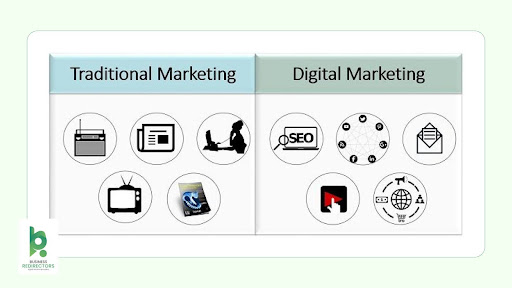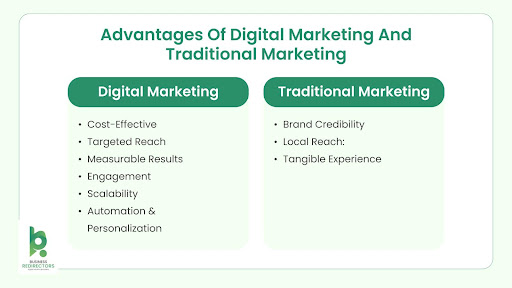Traditional Marketing vs Digital Marketing in 2025:
In 2025, the debate around traditional marketing vs digital marketing has become more relevant than ever. Businesses worldwide are asking: Should we invest in digital platforms or stick with tried-and-tested traditional methods? The truth is, both approaches hold value—but the real winner depends on your goals, audience, and strategy.
This guide explores the difference between digital marketing and traditional marketing, their examples, pros, cons, and how businesses can combine both for maximum growth.
Traditional Marketing vs Digital Marketing: Examples in Action

To understand the contrast, let’s break down traditional marketing vs digital marketing examples:
- Traditional Marketing Examples: TV commercials, print ads, radio spots, billboards, flyers, and event sponsorships.
- Digital Marketing Examples: SEO blogs, PPC campaigns, social media ads, influencer marketing, email campaigns, and video content.
While traditional marketing provides tangible experiences like brochures and magazine ads, digital marketing excels in targeted and measurable campaigns.
Difference Between Digital Marketing and Traditional Marketing

Here’s a closer look at the difference between digital marketing and traditional marketing in 2025:
Digital Marketing Advantages
- Cost-Effective: Great for startups and SMEs with smaller budgets.
- Targeted Reach: AI tools help deliver ads to specific demographics.
- Measurable Results: Track campaign success with analytics tools like Google Analytics.
- Engagement: Social platforms encourage direct interactions (likes, shares, comments).
- Scalability: Campaigns can scale globally with a few clicks.
- Automation & Personalization: AI-driven campaigns send the right message at the right time.
Limitations: Ad fatigue, privacy regulations, and high competition.
Traditional Marketing Advantages
- Brand Credibility: Print and TV ads still hold trust, especially with older demographics.
- Local Reach: Great for targeting a specific geographic community (newspapers, events).
- Tangible Experience: Brochures, flyers, or physical ads create a sensory impact.
Limitations: High cost, limited reach, less targeting, and difficulty in measuring ROI.
The Hybrid Approach: Best of Both Worlds
In 2025, the smartest businesses aren’t choosing sides—they’re combining both. For example:
- A local restaurant runs geo-targeted Facebook ads (digital) while distributing flyers in nearby communities (traditional).
- A tech company publishes thought-leadership blogs (digital) while sponsoring industry conferences (traditional).
This hybrid approach builds credibility while maximizing reach, ensuring businesses don’t miss potential customers on either side.
Conclusion
The battle of traditional marketing vs digital marketing in 2025 isn’t about declaring one absolute winner—it’s about understanding how they complement each other. While digital marketing offers scalability, targeting, and measurable ROI, traditional marketing still provides local trust and tangible connections.
For most businesses, the future lies in a blended strategy that uses the cost-effectiveness of digital and the brand authority of traditional channels.
👉 At Business Redirectors, we help companies design tailored strategies that merge both worlds—so your brand can compete smarter, reach further, and grow faster.
Frequently Asked Questions (FAQs)
Q1. What is the difference between digital marketing and traditional marketing?
Digital marketing uses online platforms like search engines, social media, and email for targeted, data-driven campaigns, while traditional marketing relies on offline channels like print, TV, and radio with broader, less measurable reach.
Q2. What is an example of traditional marketing?
Examples include newspaper ads, TV commercials, billboards, flyers, and sponsoring local events. These methods are effective for building local brand awareness.
Q3. Is traditional marketing still effective?
Yes, traditional marketing is still effective for reaching older demographics, building credibility, and targeting local audiences—but it’s less cost-efficient compared to digital.
Q4. Which one is better, marketing or digital marketing?
Digital marketing is generally better for scalability, targeting, and ROI in 2025. However, a mix of both traditional and digital often delivers the strongest results.
Q5. Why is digital marketing growing faster than traditional marketing?
Because it offers real-time analytics, lower costs, and precise targeting, making it more adaptable to changing consumer behavior and global competition.
